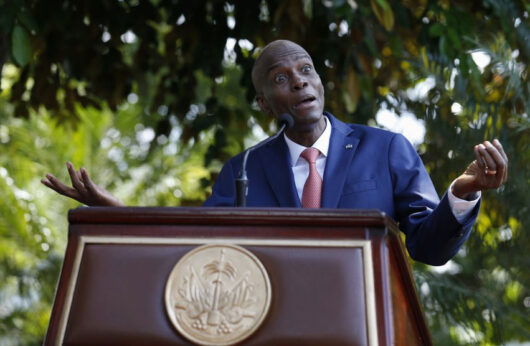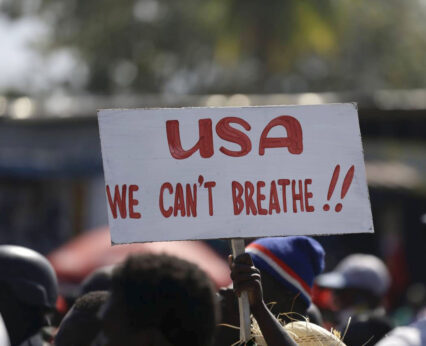
WASHINGTON––On the morning of March 1 at the Embassy of Haiti, local D.C. organizers with Black Alliance for Peace (BAP) held a solidarity rally with the people of Haiti who are rising up against a U.S.-backed dictator.
Jovenel Moïse’s term of office ended Feb. 7, but he has so far refused to relinquish power. Moïse, who claims that his term ends in 2022, has the support of not only the United States but also the Organization of American States (OAS), the European Union (EU), and his own military.
The Black Alliance for Peace, an organization seeking to recapture and redevelop the historic anti-war, anti-imperialist, and pro-peace positions of the Black Liberation movement, recently put out a statement on the situation in Haiti.
The Black Alliance for Peace is demanding the Biden administration:
Withdraw financial support for the illegal constitutional referendum and the Moïse dictatorship.
Respect the will of the vast majority of the people demanding democracy and Haitian self-determination.
Reaffirm support for the right to peaceful protest.
Immediately cease all U.S. financial and military support to Haiti’s security forces.
Condemn the recent violence against the protesters and journalists.
Demand the immediate dismantlement of all paramilitary forces in Haiti and the disarmament of gangs carrying out wanton violence against the popular movement.
At the D.C. rally outside the embassy, BAP supporters and members denounced the repression of demonstrators in Haiti and continued imperialist aggression against the island. The establishment of modern Haiti was the result of the first successful slave revolt in history, from 1791 to 1804, which saw self-emancipated former slaves found their own republic after ousting the French colonizers and slave owners.

Max Rameau of Pan African Community Action (PACA), who was born in Haiti, talked about why the United States continues its aggression towards Haiti. “This is exactly why the U.S. wants to dominate Haiti–to make money.” Rameau drew attention to the decades of outside interference which has plagued Haiti’s internal affairs.
“The difference between George H.W. Bush and Bill Clinton, Rameau said, was that Bush wanted to put in a military dictatorship in order to help American businesses exploit Haiti. Bill Clinton wanted to help American businesses exploit Haiti by putting in the president that the Haitian people supported and forcing him to do things that he didn’t want to do.
“That is the difference between conservatism and liberalism…. We must end the colonial domination of Haiti and Black communities,” Rameau told those assembled.
Same-day actions also took place in the San Francisco Bay Area in California, where BAP organizers held a rally in front of the United Nations building.
The anti-war and anti-imperialist movements have been (re)building since the Trump administration and now that Joe Biden is president, the re-mobilization continues, with organizations like BAP growing in response to the hypocrisy of the U.S. government.

The Haitian aggression is a continued imperialist project to pursue U.S. monopoly interests in the region and have the local governments support it while exploiting their populations. Similar aggression is happening throughout the Caribbean, including against Cuba. The tightened economic warfare against that island which was pushed by Trump still continues under Biden.
In the case of Venezuela, the current White House administration still refuses to recognize the democratically elected leader, President Nicolás Maduro. Instead, it continues to back failed coup leader Juan Guaidó.
The moves to shore up U.S. imperial power are not just limited to Latin America, though; China is also a target when it comes to the U.S. trying to maintain its hegemony at sea and in propaganda campaigns concerning the treatment of Chinese citizens. In Africa, the ongoing strategic placement of new military bases that started under the Bush administration carries on, constituting a new form of colonization on the continent.










